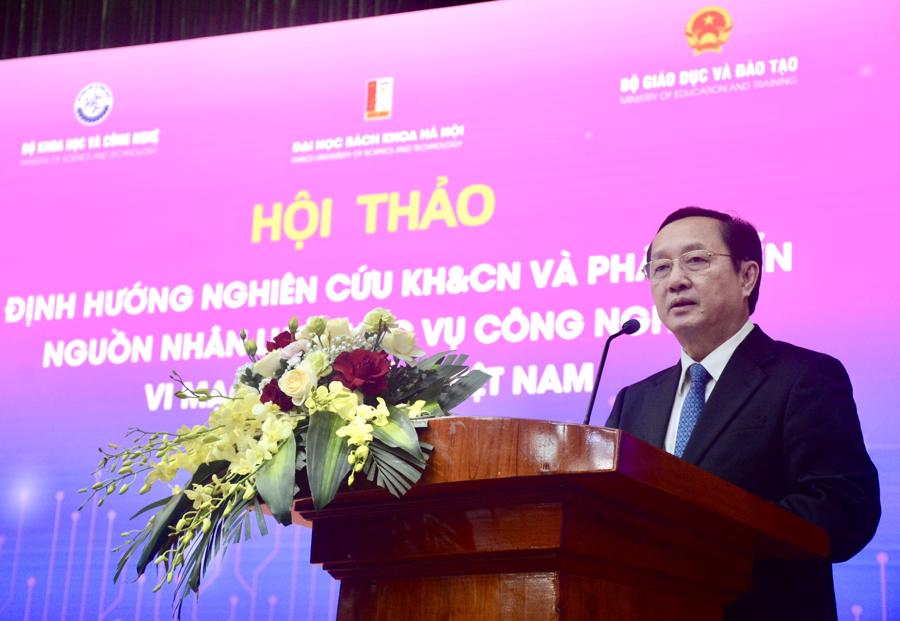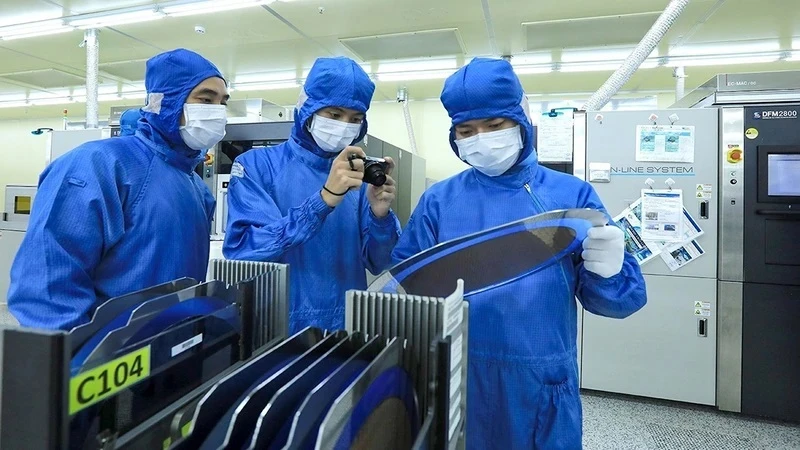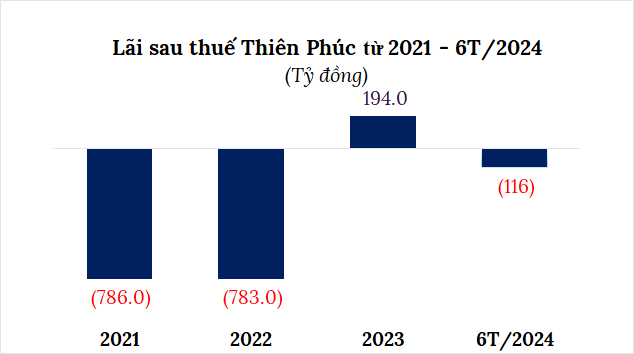On April 17, 2024, the Ministry of Science and Technology, the Ministry of Education and Training, and the Hanoi University of Science and Technology held a workshop on “Orientation of Science and Technology Research and Human Resource Development for the Vietnamese Semiconductor Microelectronics Industry”.
SEMICONDUCTOR CHIPS ARE LIKE “RICE GRAINS”, KEY TO FUTURE DIGITAL TECHNOLOGIES
At this workshop, experts unanimously agreed that today, all sectors of the economy are operated based on small chips – from computing, telecommunications, banking, security, healthcare, home appliances to transportation (especially electric vehicles), manufacturing, entertainment, etc.
Advances in the fields of artificial intelligence (AI), Internet of Things (IoT), big data (BigData), 5G telecommunications, supercomputers, and self-driving cars, etc. all rely on the increasingly strong development of the semiconductor industry.
As the “lifeline” of the digital economy, the semiconductor industry plays a pivotal and important role and is the focus that attracts many industries around the world. According to forecasts, this industry can generate more than 620 billion USD in revenue in 2024 and increase sharply to 1,000 billion USD in 2030 (Gartner). This industry is also considered a core part of the technological competition among major powers in the 21st century.

Sharing this view, Minister of Science and Technology Huynh Thanh Dat likened semiconductor chips in particular, and the semiconductor industry in general, to “rice grains” because it nourishes all other sectors in the technology era, and is the key to future digital technologies.
The semiconductor industry is playing an increasingly important role in the global economy, with a global market size of over 520 billion USD in 2023 and continuing to grow rapidly. Over the past 30 years, the semiconductor industry’s value chain has been shaped and has high barriers to entry, making it difficult for developing countries to participate.
However, according to the Minister, with the relocation of the semiconductor industry value chain after the Covid-19 pandemic and the technological competition among major economies, Vietnam is assessed as a country with many opportunities and necessary factors to develop the semiconductor industry ecosystem, and has the potential to improve its position in the global semiconductor supply chain.
In recent times, the legal framework to create conditions for prioritizing attracting investment and developing semiconductors has been focused on, accordingly, the Investment Law and the Enterprise Income Tax Law have added special incentives for large-scale, high value-added high-tech projects, including semiconductor manufacturing projects.
The Minister added that the Science and Technology Development Strategy and Innovation to 2030 have identified “microcontroller chip manufacturing technology, semiconductor components …” as one of the core technologies targeted for development in the decade to come.
OPPORTUNITIES FROM THE SHIFT IN THE SEMICONDUCTOR MICROELECTRONICS SUPPLY CHAIN
Up to now, Vietnam has been attracting more and more large corporations in the semiconductor microelectronics industry from the United States, South Korea, Japan, and Taiwan, the Netherlands, etc. with about 40 companies. Besides, many domestic companies have also entered the market such as Viettel, FPT, VNChip, etc.
According to a representative from Viettel, in the context of the semiconductor value chain gradually shifting to Southeast Asian countries, Vietnam is assessed to have sufficient conditions and necessary factors to develop semiconductor technology, from a stable political system, favorable geographical location, abundant raw materials to abundant technical and technological human resources, and increasingly developed digital infrastructure.

Some experts forecast that the scale of the semiconductor industry in Vietnam will reach 20-30 billion USD by 2030, but only two domestic companies, FPT and Viettel, have participated in this market in the first stage, out of a total of more than 50 companies in the industry.
In terms of manufacturing, Vietnam has assembly and testing plants of major corporations such as Intel or Amkor, but there are no fabrication facilities yet.
Providing more information about the global value chain of the semiconductor microelectronics industry and Vietnam’s ability to participate, the Ho Chi Minh City High-Tech Park Management Board stated that Vietnam has about 50 companies operating in microchip design services, most of which are FDI companies with a workforce of nearly 5,000 engineers. The majority of these businesses are located in Ho Chi Minh City.
In the field of microchip packaging, following Intel, Amkor, and Hana Micron have built factories in Vietnam. Besides, important enterprises in the supply chains of packaging enterprises such as Besi have begun to move to Vietnam.
From the data above, Mr. Nguyen Anh Thi, Director of the Ho Chi Minh City High-Tech Park Management Board, believes that Vietnam has the potential to participate more deeply in the global supply chain of the semiconductor microelectronics industry in the design and assembly stages.
The strategic issue for Vietnam is how to take advantage of the ongoing shift in the global supply chain of the semiconductor microelectronics industry and effectively exploit its potential and strengths to participate more deeply in the global supply chain of the semiconductor microelectronics industry, a strategic industry for the country’s industrialization and modernization.




































